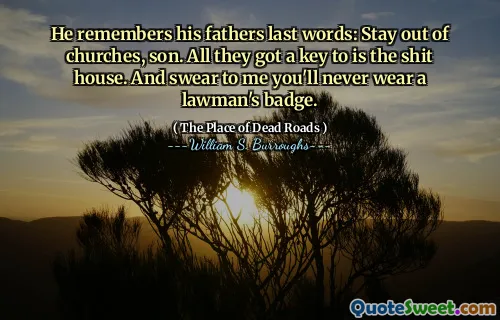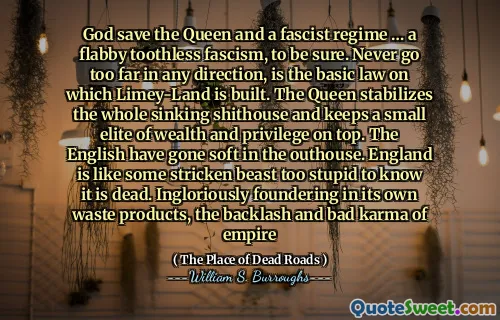"The Place of Dead Roads" is a compelling novel by William S. Burroughs that weaves together elements of science fiction, adventure, and philosophical introspection. The narrative follows the character of Kid, a gunfighter who embarks on a quest through a surreal landscape filled with encounters that challenge his understanding of reality and morality. Throughout the story, Burroughs explores themes of power, violence, and the individual's place in society, using the Wild West as a backdrop to reflect on broader existential questions.
As Kid navigates various conflicts and confrontations, he encounters a diverse cast of characters, each representing different facets of human nature and societal structures. The dialogue and interactions are rich with Burroughs' characteristic wit and cynicism, revealing the absurdities of life and the often blurred lines between law and chaos. This unique blend of humor and darkness invites readers to ponder deeper philosophical issues while remaining engaged in the unfolding narrative.
The novel is not just a simple tale of Western tropes but a complex commentary on the human condition. Burroughs challenges conventional storytelling by interspersing fragmented narratives and dream-like sequences, encouraging readers to question the nature of reality itself. In "The Place of Dead Roads," the journey of the protagonist functions as a metaphor for the search for meaning in a world rife with contradictions and moral ambiguity, making it a thought-provoking read that resonates on multiple levels.
More »
Today Birthdays
1729 -
Edmund Burke
1949 -
Haruki Murakami
1954 -
Howard Stern
1876 -
Jack London
1993 -
Zayn Malik
1951 -
Kirstie Alley
1863 -
Swami Vivekananda
1923 -
Alice Miller
1987 -
Naya Rivera
1825 -
Brooke Foss Westcott
1944 -
Joe Frazier
1951 -
Rush Limbaugh
1964 -
Jeff Bezos
1978 -
Jeremy Camp
1628 -
Charles Perrault
1856 -
John Singer Sargent
1970 -
Kaja Foglio
1953 -
Rick Santelli
1986 -
Gemma Arterton
1968 -
Raf Simons
1958 -
Christiane Amanpour
1966 -
Olivier Martinez
1996 -
Ella Henderson
1917 -
Maharishi Mahesh Yogi
1949 -
Ottmar Hitzfeld
1928 -
Ruth Brown
1968 -
Heather Mills
1946 -
George Duke
1968 -
Rachael Harris
1923 -
Ira Hayes



